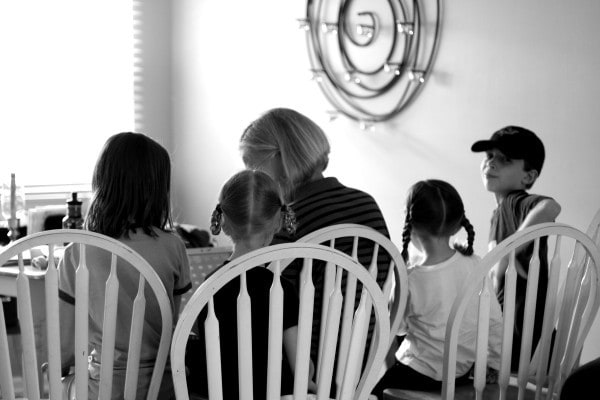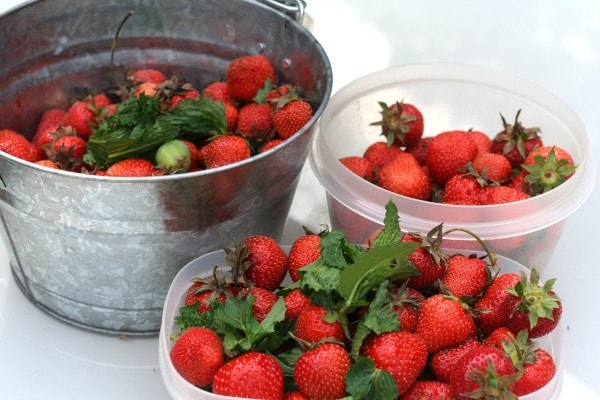 Every Monday, I answer a few of the questions that my readers send me. If you have a question you’d like me to answer in a future Q&A post, just leave me a comment here or email me (thefrugalgirl [at] gmail [dot] com) and put Q&A in the subject line. I look forward to hearing from you!
Every Monday, I answer a few of the questions that my readers send me. If you have a question you’d like me to answer in a future Q&A post, just leave me a comment here or email me (thefrugalgirl [at] gmail [dot] com) and put Q&A in the subject line. I look forward to hearing from you!
Hi everyone! My mom’s here today to answer the rest of the question that you all had for her. 🙂
When your last kid left, it must have been even more of an empty nest than for those whose kids go out to school – so how do you fill your days now? -Katy
Generally you don’t get all your kids in one lump sum, and they also don’t leave all together at the same time suddenly. So my change in life has come very gradually. One by one they needed less and less supervision for their schooling. One by one they graduated from home school.
As my time freed up a bit, I started getting involved in other areas. I began to direct a junior choir. I took on being in charge of our church library. I began to help my younger sister and two of my kids with their own homeschooling by teaching there once a week. As time as gone on, grandchildren have been added one by one and now we have 13. Since I spend time with them and their parents, that takes up a big chunk of my time. My husband and I also enjoy traveling a bit and camping together.
Do you have any advice for parenting teenagers, particularly about how to know when to give more independence?
-Libby
That is a huge subject, and I don’t feel anything like an expert on that subject. Independence is an earned thing for the most part. Children who show themselves responsible in small things, can be rewarded with larger responsibilities. Children who show themselves unfaithful in assigned responsibilities can expect a reduction in their independence. Clear communication about your expectations and consequences would be important, as well as consistency.
Perhaps you can initiate some opportunities for independence for them, and communicate to them that this is a challenge for them, an opportunity to demonstrate they are ready for even more independence. That said, I do think there is room for some grace, especially if irresponsibility has not been a pattern.
If you could redo or undo something you did when your children were little, what would it be? -Lori
I would hope that I would be more patient and not yell at them. I always was praying that I would be better at being consistent in disciplining them.
But primarily I hope I would place a stronger emphasis on the heart issues behind the behavioral issues they had. I also hope I would be better at applying the gospel to each situation that came up so they could see how the gospel affects our approach to everything. We did that to some degree, but I have learned so much more about the actual heart issues that feed our behavioral issues and how the gospel relates to that, that I think I could do a better job of it now. I also hope I would be better at examining my own heart issues and be more humble in admitting to my own sins against them.
Did you teach frugality to your children? How did you help them learn to not worry about keeping up with the Joneses?
-CNM
We didn’t have a comprehensive plan for this, but I can tell you what we did. When the kids were pretty young, we started giving them an allowance. Part was to keep and part was to give in an offering at our church. They could save their part along with birthday money for things they wanted. When they were older, in grade school sometime, we worked with them to develop a more complicated budget, which had more categories. They would keep track of this on paper. Later on this was replaced by a spread sheet on the computer.
We encouraged them to get jobs and in fact hired them to work in our lawn irrigation business. Our oldest son started at age 9. We gave them a clothing allowance sometime in high school, which allowed them to pick what clothes they wanted, but forced them to stay in budget unless they wanted to finance the purchase themselves. They paid for their own car insurance and saved for their own cars when they started to drive. Some had cars right away; others paid us for gas money to use our cars for a short period of time.
In short, we tried to help them make the connection between work and money so they could understand that a purchase was equal to giving up a certain amount of time and effort in work.
Aside from that, I think we led somewhat by example. They had two sets of frugal grandparents (products of the depression days), and we were careful with how we spent money. We weren’t set on “keeping up with the Joneses” so I think that helped them a bit with that issue.
I want to help foster a healthy relationship between my children and their grandparents. Do you have any tips on that from a grandmother’s perspective?
-Kristina
Part of your children’s attitudes toward their grandparents comes from your attitude toward them. I appreciate it that my children have encouraged their children to think that visiting with us is special and that they consider us to be special people in their lives. I lived far from my own grandparents, but my parents helped us see them as very special people in our lives. We were taught to express appreciation for gifts and to be grateful for their visits.
If you happen to have relationship problems with your parents, I would suggest keeping those private from your children and concentrate on helping them to enjoy the positive things about your parents.
I also appreciate the freedom to be able to do things with the grandkids and take them places. In some ways, that is to the parent’s advantage, but perhaps some parents might feel unnecessarily protective about that.
If your parents don’t take a lot of initiative to spend time with your kids, you could plan to invite them to spend time with you. We enjoy being in our children’s homes for dinner. You could invite them on a trip to a museum, picnic, concert, or other outing.
From the grandparent side of things, I would suggest taking some initiative to do things with the grandkids. And I would try to accept as many babysitting opportunities as possible (within reason 😉 ). Even though it can be inconvenient at times, it usually is a great opportunity to build relationships with them. And when you do babysit, spend time with them (read, play games, do a fun project).
And… I am finding that the grandkids have the same pesky habit that my kids had; they are growing up way too fast.
I am dying to hear about Latin!! Did you study it as a girl? What’s it like teaching Latin to youngish children?
-Priskill
I actually didn’t learn Latin until I started to teach it to my youngest son and nieces. Basically I learned it along with them. I had experience in learning Spanish and German in my school days, and I love words and languages, so this wasn’t an awesome thing to me.
Basically the approach I have used with Latin (and this is not original with me) is to capitalize on young children’s basic ability to memorize things. Our curriculum has a weekly word list and we memorize sayings, noun declension chants, and verb conjugation chants.
I wouldn’t start Latin too young. I think 4th grade is plenty early. I think we all learn more about our own language by studying another, and Latin is especially useful in seeing where the meanings of many English words come from.
What is your favorite hobby?
-Sarah
I love to read, bike ride, cross-country ski, and camp. Recently we have combined our biking and camping and have taken some longer bike camping trips.
I’d like to know how you felt about homeschooling, and I’m so impressed that you and your husband reared children who love the Lord. Any comments on that? My children range in ages from 13-5, and I hope that they grow into God loving adults. My husband and I are trying to sow the seeds now, but won’t always be around when the children are older.
-Molly F.C.
I loved homeschooling for many reasons. It gave us an opportunity to closely supervise our children’s Christian training and character issues. It allowed us to easily accommodate my husband’s job where he often traveled 40 days at a time and had times off before and after trips. It gave us more family time together. It saved the kids a great deal of time so it allowed them to pursue some of their own interests more seriously. I have a natural bent to love learning and teaching so it “fit” me well.
But, I would caution anyone who thinks that homeschooling is a guarantee that the kids will “turn out” well. We cannot control our children’s hearts. In our case, our desire was for our children to follow after Jesus Christ and embrace the gospel. While I believe God used our homeschooling for spiritual good in the lives of our children, it was not what saved them. That I attribute to God working in their hearts, which I believe we can pray for with faith, since it is a prayer he loves to answer.
How did you learn to cook/sew/garden?
What do you grow in your garden? How much time do you spend gardening per week?
-Dove
I learned to sew in a home ec class in high school. I hated it, but once I got married, I developed a more domestic streak and tried sewing on my own. It was much more satisfying without the time deadlines of a class period and the pressure of a grade.
I just did some minimal cooking before getting married. My mother always told me that if I could read, I could cook. That is how she learned to cook. And it worked for me too. I just read recipes and did what they said. I took a more pro-active course with my own kids.
We have a rather large garden. Perennially, we raise blueberries, strawberries, and raspberries, and some apples. On an annual basis, we grow tomatoes, green beans, summer and winter squash, green peppers, eggplant, cucumbers, lettuce, and broccoli. We give a lot of it away to our family.
My husband learned to garden in his childhood. We also read up on it in books and magazines. Our gardening has always been a shared project, sometimes with him having more time, sometimes with me having more time. We have a mostly organic garden and don’t use any purchased fertilizer. Since he retired several years ago, he does more work on it than I do, but most of our married life I did the tending and planting, while he always tilled, hauled in manure, put up stakes, etc. I have no idea how to say how much time per week I have put in because garden work varies as the season progresses. A garden needs at least one good weeding every week and in the thick of production time, needs picking every two to three days.
______________________________
Today’s 365 post: 4 weeks and 90




priskill
Tuesday 6th of March 2012
Thank you so much for these answers -- it's especially encouraging to hear that you began Latin later in life. I am 54 and thrilled to find that it's not too late! The schedule you describe sounds awesome -- what a gift for them to have this special instruction in the language that birthed English!
Also, so agree with the grandparenting advice. We live 3,000 miles from both sets of grands, and our daughter still adores them and regards them as the special people who really do love her unconditionally. I think it is one of the most special relationships a child can have, and your 13 are incredibly lucky to have you (and not just because of the Latin :) ) Thank you for your answers!
kim
Tuesday 6th of March 2012
Great post!
Susanna
Tuesday 6th of March 2012
your mom sounds awesome! I agree with the grandparents and hiding any issues parents have with them - I always knew my mom and one uncle had problems with my grandma - I loved her as a grandma and she was an awesome grandma but my memories and attitude towards her when she was alive - well I felt I had to act disapproving too to make my mom 'happy' and I regret this esp now that both are gone.
what does your mom mean about 'heart issues' with the behaviour? I don't quite understand.
Jo@simplybeingmum
Tuesday 6th of March 2012
Thank you Kristen's Mom! The advice about patience is a great reminder. I don't want to look back and regret. I try to keep in mind (but I do make mistakes of course) that in terms of losing patience and how I speak to my children it shouldn't any any different to how I speak to an adult or a non-family member - it needs to be respectful ('give respect to receive respect').
Dianna @ practicing frugal
Monday 5th of March 2012
I really enjoy reading your mom's answers to the questions. I hope you do a Q & A with her again.